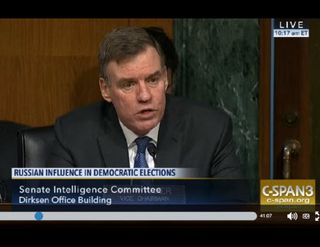Sen. Warner: Russian Interference Not 'Fake News'

Senate Intelligence Committee ranking member Mark Warner (D-Va.) cited the media "echo" chamber at the first day of a week-long committee hearing Thursday (March 30) on Russia's attempts to influence the presidential election.
"Russia continually sought to diminish and undermine our trust in the American media by blurring our faith in what is true and what is not," he said in his opening statement. "Russian propaganda outlets like RT and Sputnik successfully produced and peddled disinformation to American audiences in pursuit of Moscow’s preferred outcome," he said.
But Warner suggested Russia had help in this country as well.
"The Russians employed thousands of Internet trolls and botnets to push out disinformation and fake news at high volume, focusing this material onto your Twitter and Facebook feeds and flooding our social media with misinformation," he said. "[T]his fake news and disinformation was then hyped by the American media echo chamber and our own social media networks to reach – and potentially influence – millions of Americans."
And as to President Donald Trump's tweets about Russian influence investigations being 'fake news," Warner had a response, though he did not make it personal: "This is not innuendo or a false allegation. This is not fake news. This is what actually happened to us."
The Senate Intelligence Committee is taking the lead after a House Intelligence Committee inquiry into Russian interference was sidelined by the chairman of that committee, Rep. Devin Nunes.
"This investigation is NOT about whether you have a “D” or an “R” next to your name. It is NOT about re-litigating last fall’s election. It is about clearly understanding and responding to a very real threat," said Warner.
Committee chair Richard Burr (R-N.C.) said the role of Russia in the 2016 elections was a "critical intelligence question." Most of the committee's investigation will not be in public, but said it was crucial to take the "rare step" of publicly discussing the investigation. He said there would be more open hearings. He said "malign actors are using old techniques and new platforms to undermine our democratic institutions."
The hearing was to essentially provide a baseline understanding of Russian disinformation campaigns and the role of cyber efforts, including social media and other online activities. He said the takeaway from the hearing was that we are all targets of active Russian efforts. "The public deserves to hear the truth about possible Russian involvement in our elections," he said. “We’re going to get to the bottom of this, and do it right,” said Warner.
Clinton Watts, who was testifying as a senior fellow at the George Washington Center for Cyber & Homeland Security, put what he said was a cyber imbalance between Russia and the U.s. this way: "[Russia] has the best hackers that are out there...We, on the other hand, worry a lot about who we are going to bring into the cyber field because they might have smoked weed one day or they can't pass a security clearance."
Asked by Burr what the takeaway for U.S. media outlets was from that Russian hacking supremacy in terms of disniformation, Watts said: "They [the media] have to improve their editorial processes, and they also have to take a step back from the 'I gotta get it out first' competitive environment."
He said part of the reason the Russian system of disinformation works is that with every outlet racing to get the story out first--in an age when stories can be turned around and posted in minutes--"they put themselves at risk to fall for these sorts of schemes.
He said until that improves, or until "they collectively have some sort of standard that the public or the media holds to itself, we're going to keep seeing them fall for these campaigns," and not just from Russia. "The playbook has been thrown out there, he said, and many other nations are going to pick it up.
Multichannel Newsletter
The smarter way to stay on top of the multichannel video marketplace. Sign up below.
Contributing editor John Eggerton has been an editor and/or writer on media regulation, legislation and policy for over four decades, including covering the FCC, FTC, Congress, the major media trade associations, and the federal courts. In addition to Multichannel News and Broadcasting + Cable, his work has appeared in Radio World, TV Technology, TV Fax, This Week in Consumer Electronics, Variety and the Encyclopedia Britannica.

